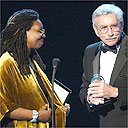
A week in New York and I return to find the country drowsy with post-Jubilee fever and drunk with the ecstasy of World Cup victory. In New York the Jubilee is reported with the indifference reserved for cheese-rolling in the Pyrenees, but the World Cup is keenly reported and all the matches shown on ABC Sports. Football - "soccer" - is now played by more people than play baseball, as I pointed out to a rare all-American cab-driver. "Yeah," he scowled, "but they're kids. And women. And Latinos." In a decade 50% of Americans will be Spanish speaking; the kids will be grown up; the women won't have lost their interest. Work it out for yourself: invest in US soccer NOW!
I saw a few fragmentary images of the Jubilee in New York as if down the wrong end of a telescope: the Queen looking seasick in a gilded coach drawn by eight white horses, the Queen surrounded by Cliff Richard, Paul McCartney, Ricky Martin and The Corrs still looking seasick, the Queen reviewing the drive-past of Her Majesty's Hell's Angels almost smiling. It was clear what was going on. A country marinated in Cilla and Davina, Graham Norton and Dale Winton, Barbara Windsor and Wendy Richards, Elton John and Posh Spice was celebrating in appropriate fashion: a festival of high camp.
My own contribution to the Jubilee was less enterprising. I made a short speech about the arts in front of the Queen at the Royal Academy. HMQ, it was said, wanted to recognise the arts as one of our great national assets and was therefore contributing personally to the funding of awards to encourage young talent, which she would present in person. She passed through the Summer Exhibition, artfully steered away by the president of the RA from anything provocative, and I met her at the door of the gallery in which the presentations were to take place. I led her, somewhat reluctantly on her part, across the room to a small platform, making only a small detour round Beryl Bainbridge who, lost in conversation, was unaware of my hissed entreaties to clear a path for the monarch.
In the course of my short speech the Queen remained inscrutable. If she agreed with me that the government should increase its support for the arts, she kept it to herself. Only when I quoted this (from John Ruskin) did she respond: "Great nations write their autobiographies in three manuscripts: the book of their deeds, the book of their words and the book of their art. Not one of these books can be understood unless we read the other two, but of these three, the only trustworthy one is the last." As I spoke the last sentence I turned to share this - possibly ironically - with HMQ. Her eyes were fixed with no great curiosity on a spot on the ceiling, her heart no doubt longing to be delivered from the tedium of polemic.
Which is how I felt when I sat last week at the Tony Awards, New York's massively self-regarding ceremony to celebrate and promote New York theatre. The "Tonys" are no more or less bizarre, impenetrable or ridiculous than any other award cere mony. My production of The Crucible had, as they say, six "noms". "It's an honour just to be nominated," people said to me. After a journey of 3,000 miles, it seemed rather more to the point to win, but seeing a TV programme about Tony prospects the night before protected me from any false hopes. " The Crucible ?" groaned a perfectly co-ordinated quartet of Broadway experts, "The CRUUUcibell? It's so SERIOUS!"
But nothing could have been more serious than the master of ceremonies who addressed the audience in Radio City Music Hall before the show began. He discouraged winners from mak-ing excessively long acceptance speeches. "The music will start if you go over," he warned. To no avail. Time after time the music came in like the tide, washing over the winners as they thanked their mothers, fathers, children, partners, agents, managers, publicists and dressers until their words, in a tender mercy, were drowned by the music.
The next day I was at another theatrical event, the polar opposite of the Tony Awards, a celebration - or memorial - for Irene Worth, who dropped dead in the Post Office at the age of 85 - or, according to her sister, 86. She said to me once: "If I ever meet Shakespeare in heaven, I shall say to him you didn't write enough parts for women." She was an actress of huge virtuosity and passion and the celebration of her life ended with a perfect metaphor for her art: a flamenco dance performed by a ferociously solemn and beautiful Spanish woman, a dance of intense, dark, disciplined passion, which edged towards the ridiculous, but defied you not to be serious and not to be moved.
When Irene Worth collars Shakespeare in heaven, she might also cross the path of her contemporary, the Hollywood mogul, Lew Wasserman, who died last week. If Hollywood is Mount Olympus, Lew Wasserman was Zeus. I met him once when, improbably but graciously, he hosted a party for the National Theatre when we were visiting Los Angeles with a production. At dinner he talked about his life and at least half of what he said might have been true. He talked about his days as an agent for bands and vaudeville acts, hundreds of them, whom he saw night after night in club after club in New York or Chicago or Los Angeles or Las Vegas. "You must have met a lot of criminals in your work," I said. "Richard," he said, absolutely straight-faced, "I have never met a criminal in my life."

